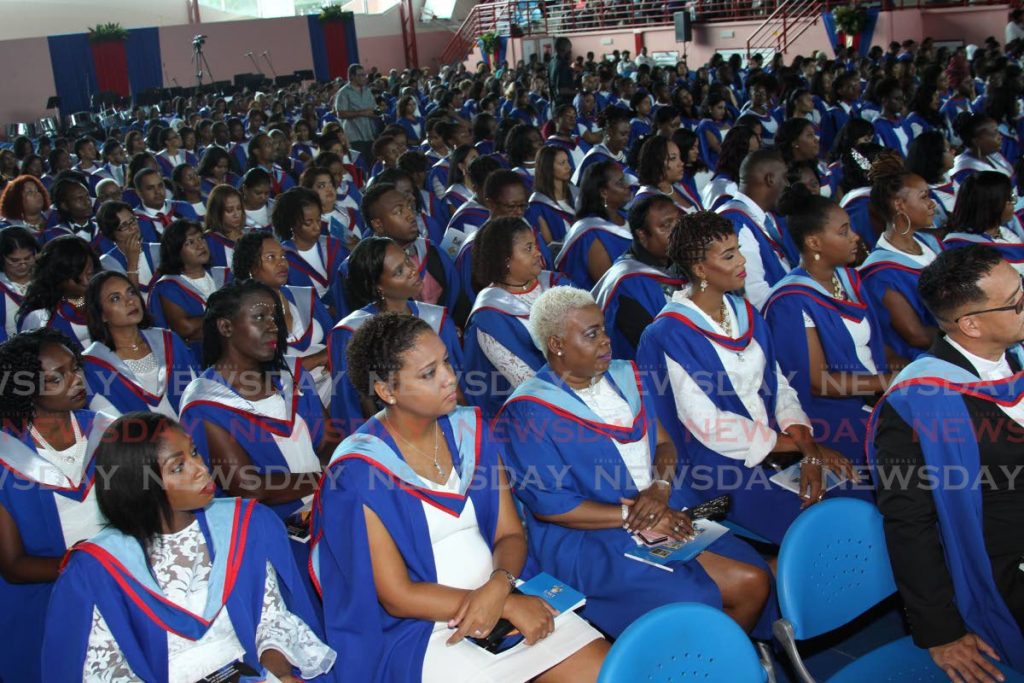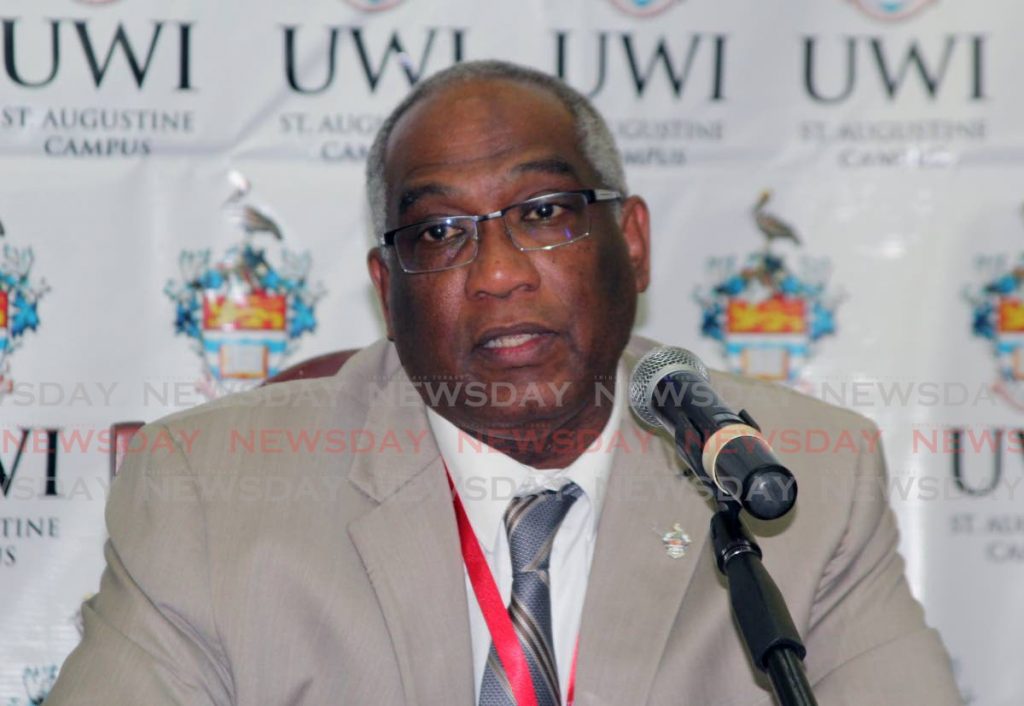UWI to review GATE plan as government cuts funding

Due to the economic landscape of the country, UWI St Augustine principal, Professor Brian Copeland expected cuts to or the removal of the GATE programme this year.
He told Sunday Newsday he spoke to staff and students about the possibility in September.
“We knew a change was coming. It’s just that we didn’t know when and we didn’t know the details but if you looked at the signs, even pre-covid, you would know that GATE (Government Assistance for Tuition Expenses) was a great uncertainty going forward.”
He made the statement in response to Education Minister Dr Nyan Gadsby-Dolly’s announcement on Friday that GATE funding would be provided for one programme per student up to undergraduate level, and that funding for post-graduate programmes was discontinued effective immediately.
She said funding would depend on the monthly household income of students and a means test. Those with incomes below $10,000 would receive 100 per cent funding, between $10,000-$30,000 would receive 75 per cent funding, between $30,000 and $75,000 would receive 50 per cent tuition, and those above $75,000 a month will not be eligible for GATE.
Copeland expected to meet with members of UWI (University of the West Indies) executive on Monday to discuss the ramifications of the changes now that the parameters were known.
He said they already made short, medium, and long-term plans for the institution with the assumption that there would be no GATE. Therefore, at the meeting, they would determine the necessary adjustments to their plans, including their budget response plan.
“I keep telling people if the government has zero, we will get zero. In fact, what the university has been doing, we have been taking more responsibility for it’s management as a business.”
He said he “got a lot of flack” from staff and students when he first made the statement two or three years ago. But, he said, since UWI got funding from the public and government, it would have to account for those funds and be prepared to stand on its own “because that’s where we’re going in any case.”
Copeland said he knew the GATE system was exploited, as it led to the term “programme hoppers” as well as the introduction of the means test.
“I agree with the general approach of focussing the resources of the country on those who could benefit from educational opportunities but could not do so because of their circumstances.”
Parents face financial challenges for children's studies
One single mother from Marabella said, as a past recipient of GATE, she was aware that many people abused the system by switching courses frequently, not attending classes, or dropping out of courses.
However, she said young people should not have to pay because the government did not properly monitor the system and initiate checks and balances.
“You implemented something to help people, including the less fortunate in the country, some control measures should have been put in place. Now you want to penalise the whole country?”
Her son was in the process of applying to UWI and was hoping for GATE funding so he could study medicine. With the new guidelines, he could get up to 75 per cent tuition instead of 100 per cent based on her salary, and the change could put the small family in a difficult financial position.

Now, they would have to adjust their plans. She expected that, when he is accepted, she would have to go to a financial institution for a loan. Also, he may go to the UWI Mona campus as tuition in Jamaica seemed to be the cheapest, even if they factored in housing and travel.
“I know a lot of people abused it in the past but, especially with all the stipulations, it’s affecting people who really really need the assistance. I might be able to find some other source of funds to get my son started but there are others who can’t.”
She said children were dependent on their parents and should not be limited by their parents’ financial situations. She suggested government use age limits, rather than financial limits. Therefore, means tests should be kept for older people who wanted to study while those just leaving secondary school should have full access to GATE.
She added that previous governments already removed vocational training from secondary schools, which would have helped those who struggled academically. Now, restricting GATE funding to those academically inclined would further inhibit the future of the country.
Pundit: Parents terrified over GATE cuts
In a release, pundit Satyanand Maharaj, spiritual head of the Satya Anand Ashram, agreed that the changes would lead to a significant percentage of the population being excluded from GATE funding and, therefore, higher education.
He claimed since the announcement, he received numerous calls from parents “terrified” that they could not afford tertiary education for their children.
He believed the new criteria would “reward” parents who did not work hard or have a good salary while the middle class who “pays the majority of taxes” and was “the backbone of the economy” was asked to bear another cost.
Instead, he suggested that the 100 per cent tuition limit of an income of $10,000 be increased to $20,000.
“While the potential productive potential of the nation is being sifted out of accessing higher education, unproductive elements such as CEPEP (Community-Based Environmental Protection and Enhancement Programme), URP (Unemployment Relief Programme), and TTT (Trinidad and Tobago Television) continue to receive state funding. Why not eliminate CEPEP, and URP that annually drain the treasury of over $600 million TTD? Why not eliminate TTT that no one watches but drains the taxpayers of over $75 million TTD?”
He argued that the government continually demanded that citizen “tighten their belts while the ministers loosen theirs” as citizens were taxed “to brink of poverty” while ministers’ salaries and allowances increased.
Gopeesingh: 'A dangerous, backward step'
On Friday, Gadsby-Dolly also announced a cut to the national scholarship programme, reducing the number of annual scholarships from 400 to 100. She said cognate groupings were expanded to ten segments, with scholarships to be awarded to the top ten students in each group. She added that the awards would be based “solely on academic achievement.”
She also introduced the National Bursary Programme for 500 local students who got at least eight ones and twos in their Caribbean Advanced Proficiency Examinations (CAPE).
These students who were not awarded a national scholarship would also receive 100 per cent GATE funding for study at a local institution.
However, in order to qualify, students’ would have to complete a means test, be involved in extra-curricular activities or contribute to their community or the country, and their courses of study must align with “priority areas of development.”
In a press release, former education minister Dr Tim Gopeesingh, described the new scholarship system as “a dangerous, backward step” that could undermine the integrity of TT’s education system and so should be condemned.
“The MinEd (Ministry of Education) has, however, not given the public any statistical or data-based information/findings to give reasons for this sudden change to its policy. It has also deliberately failed to provide any explanation as to what criteria it will now use to determine how the scholarships/bursaries will be awarded, and to whom, under this new policy.”
Gopeesingh noted that previously there were seven academic groupings and the majority of scholarships were given in mathematics and sciences. He said many students chose what to study based on that system and now their hard work would be for nothing.
“The fact is that students who wrote CAPE (Year 2) examinations this year – approximately 4,500 – are still querying their final grades from CXC. Their expectations of receiving scholarships in certain groupings are now being unfairly and possibly illegally dashed under this new policy.”
He questioned if it was a “dangerous and underhanded PNM political plot” where scholarships would be given without any testing or examination process, and claimed it was political mischief to serve the ruling party’s agenda as the distribution could be open to political discrimination, bias and inequality.
“The fact is that education and human capital development are the cornerstones of any civilised and developed country. Such a drastic reduction to TT’s education expenditure will indisputably take our country backward.”
He said instead of "robbing students of their future promise of progress and development," the Rowley administration should stop wasteful and corrupt expenditure in other areas of the administration.
Schol recipient: Students at a disadvantage
A former scholarship recipient said when she got an additional scholarship in 2004, tuition and books were covered. She said the process was smooth as the money was sent to her account on time and, after completing her degree abroad, she signed a contract to work in TT for five years.
If it were not for the scholarship, she said she would not have been able to study abroad because her parents could not afford it.
She said there were some pros and cons to the new arrangement but, to her, it seemed that the bursaries had similar coverage to that of some additional scholarships.
She believed it would be difficult to choose ten students per subject area, especially in the categories where a high number of students excel. Also, students at high-performing schools that were accustomed getting 30 to 40 scholarships were at a disadvantage, especially as those schools usually performed well in particular categories.
“It also means that other subjects that may be deemed less important will have scholarship opportunities. I hope the competition will motivate students to performance but it is a serious disadvantage to students with parents who simply can not afford to pay for a tertiary education, and a disappointment to those who hung their hopes on a scholarship to further their education.”


Comments
"UWI to review GATE plan as government cuts funding"